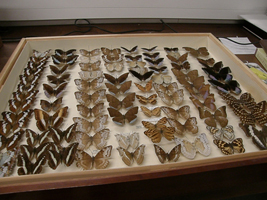- Digitalization of knowledge
- Human language technologies
- Bioinformatics
- Data mining
- Spatial data
- Mathematical modelling
Digitalization of knowledge
IT development has brought about many changes in our lives. We are surrounded by different kinds of digital content on daily basis and the human use of various types of digital collections such as language translators, microbe databases or terminological dictionaries has become almost automatic. We rarely think about how all the information that could once only be found in books has been transferred to our computers.

The data digitalization is immensely important for the academic and scientific institutions such as our Faculty. There are many collections (herbariums, insect collections, records of native species, plant diseases information and other) that have to be protected and preserved from deterioration and one way to do it is to digitalize it and organize it into databases. This way, future generations of students and researchers will be able to easily access the collections and study them in detail.
However, despite the rapid IT development, the digitalization process is still not a simple one. To create and use a collection, it is necessary to carefully design many of its parts: database structure, a way of collecting data, an appropriate digital format, interfaces for querying and searching, sets of meta data and others.

There are many different issues to be tackled when using digital databases and collections: what should the data format be, how to access the data, how to make a query, how and where to keep the data, how to digitalize the data and so on. Computer scientists and programmers can solve these problems. However, since the databases will be regularly accessed and interpreted by the scientists from various scientific fields (biology, agriculture etc), it is important to establish collaboration between these two groups so that electronic resources can be properly used both in biological and biotechnological sciences. That is why CIPB is the right place for establishing that kind of cooperation.

 Srpski
Srpski English
English